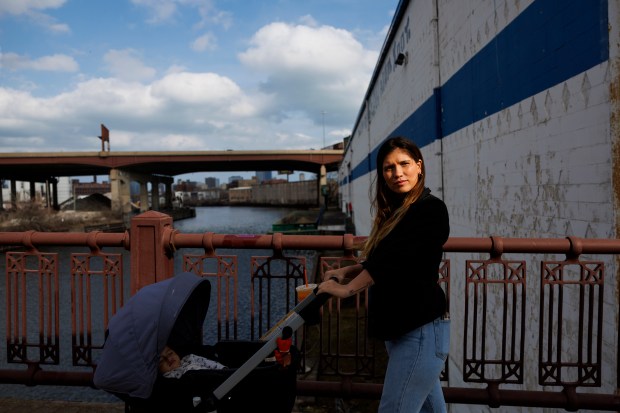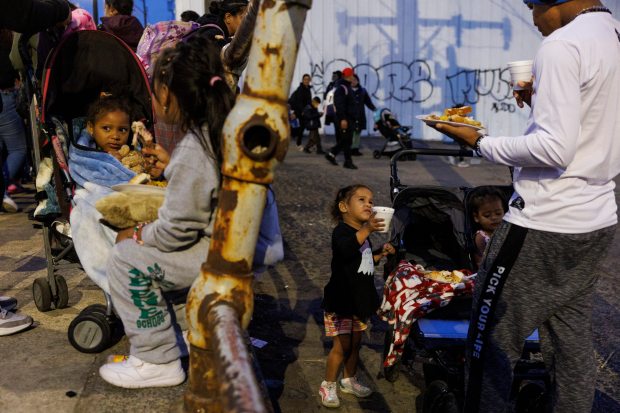Migrants living in the city’s shelters say that staff is limiting the number of hygiene products they receive to use in the bathroom and retaliating against them for accepting donations, according to interviews with migrants and volunteers who advocate for them.
The reports of rationing hygiene products come after the Tribune last week reported that a shortage of essential supplies in the city’s shelters forced some parents to reuse dirty diapers on their babies. On Sunday, volunteers distributing boxes of diapers at a city shelter on the Lower West Side said migrants told them they were being retaliated against because they are accepting donated supplies amid the shortages.
“There’s concern that when they talk to us or they take our supplies, they get in trouble,” said Southwest Collective founder Jaime Groth Searle.
Migrants outside the shelter on the Lower West Side said they’d been penalized over the past few weeks for trying to bring in outside donations to the shelter. Women reported that shelter staff would only give them one sanitary pad a day while they’re on their period and that they’re forced to ask for toilet paper before using the bathroom. They said they feel threatened by staff and scared to ask for supplies.
“You have to go up and ask for a pad and they give you one and then make a note of where you’re sleeping so you can’t ask for more,” said a woman staying at the shelter who didn’t want to give her name for fear of being kicked out.
A spokeswoman for the city denied that shelter staff was rationing essential supplies such as feminine hygiene products, diapers, milk and baby formula.
“Sometimes staff may provide these items to ensure fair distribution of what is currently on hand, but staff will not deny essential items that we keep in stock,” said Mary May, spokeswoman for the city’s Office of Emergency Management and Communications.
May also denied that migrants were being retaliated against.
The city’s 23 shelters — housing just under 12,000 people of over 36,300 migrants who have come to Chicago since August 2022, mostly on buses from Texas — are managed by the Kansas-based firm Favorite Healthcare Staffing, which has contributed to daily migrant costs of $1.5 million each day. In late January, Mayor Brandon Johnson upped the city’s latest contract to Favorite Staffing by $30 million, on top of $97 million already funneled to the vendor.
May said supplies are provided to the Favorite staff by the logistics section of the city’s OEMC. Shelter staff submit order requests to make sure migrants receive what’s needed, according to May.
“Toilet paper is provided on a table and residents may take what they need. Staff do not hand out specific amounts,” May said.
Favorite Staffing did not respond to requests for comment via email and phone.
Anghely Cepeda, 25, a mother from La Victoria, Venezuela, said migrants have to pass through a metal detector to enter the shelter on the Lower West Side, and that staff go through their bags.
On Sunday, Cepeda obtained boxes of diapers from volunteers, but told shelter staff that the diaper boxes were hers so she could pass through security, she said.
“That was the only way that I was allowed to go inside,” she said. “When I got inside, I divided up the boxes among everyone there. I wanted to help.”
Cepeda said she was kidnapped for a year in Peru — threatened, hit and held at gunpoint. She came to the United States with a newborn seeking protection and economic opportunity but said the treatment at the shelter where she’s been staying since late December has felt inhumane.
“Every family should get a roll of toilet paper, but that’s not how it’s working,” she said. “You have to go up and ask for the amount you need.”
A mother named Maria from Caracas, Venezuela, who preferred to not have her last name used said she once tried to bring in a box of donated milk from a volunteer. It was a pack of 12 cardboard milk cartons, she said, and she has three children.
“Shelter staff threw away all but three,” she said.
May said if migrants feel they are being treated poorly by staff or have other grievances about care in shelters, they can submit complaints anonymously by scanning a QR code found on flyers throughout shelters. Once a grievance is reviewed, a team reaches out to the person, conducts interviews as necessary and comes to a resolution with shelter staff and the city’s Department of Family and Support Services, she said.

In a Freedom of Information Act request, the Tribune obtained hundreds of pages of complaints submitted by shelter residents that revealed testimonies of staff treating migrants “like animals.”
“Sorry for the suggestion, but it’s sad to see the amount of food that is being thrown away here,” said one complaint in Spanish from late December.
Migrants wrote about discrimination from staffers based on sexual orientation, maggots and worms on the ground in the restrooms and food that “left them hungry after every meal.” Many wrote about a scarcity of resources with so many people living together. Some said they had been screamed at or ordered around.
After grievances were raised against shelter staff, their supervisors often resolved the complaint by recommending Favorite Staffing employees receive training on “tone and delivery communication style,” according to the documents.
Volunteers who interact every day with migrants at the shelter on the Lower West Side — which garnered controversy following the death of a 5-year-old boy staying there in December — question if the city is spending the millions it has allocated toward the migrant crisis responsibly.
“They’re not giving migrants (supplies), and when someone does, they’re not allowed to bring them in,” said Maria Perez, a volunteer with Southwest Collective.
Perez is doubling her efforts to bring supplies to shelters. She brings boxes of diapers to the shelter every weekday after her day job.
“They don’t have child care. It’s always hard for a mom who can’t go out to work,” she said. “I would never turn my back on them.”

Over the past five years, the cost of diapers nationally has gone up more than 32%, according to Eric Mayo, public policy manager at Brightpoint. Because people can’t buy diapers through programs like Supplemental Nutrition Assistance Program benefits, he said the issue needs statewide policy solutions.
“There’s nothing really out there at the moment for families who are experiencing this very basic need,” he said. “(Those) who are diaper insecure feel alone and insecure because there’s a perception about what that means about them as a parent.”
Monday night, Cepeda held and breastfed her squirming 1-year-old on the sidewalk. She said she typically receives two diapers a day from staff, but Mayo said the average mother goes through four or five in a day.
Dozens of mothers gathered around Perez’s trunk full of diapers outside the warehouse-turned-shelter. Perez worked with Cepeda to help distribute the supplies. Cepeda handed a mother a plastic tub of milk formula and a box of diapers.
“Es tuyo. This is yours,” she said, with purpose.
Kids rolled around in Gentle Touch diaper boxes on the ground outside the shelter. Later in the evening, several religious groups set up tables outside to dish out chicken and beans.
“Este lugar es temporal. This place is temporary,” said Marlon Ramirez, founder of the group Jesus Saves. “Su futuro es enfrente. Your future is in front of you.”



